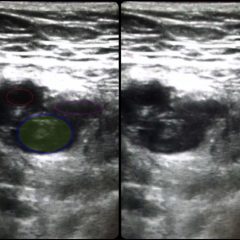Emed-Opoly: Echocardiography
ABSTRACT
Audience:
Emergency medicine residents and clerkship students, critical care medicine fellows.
Introduction:
Echocardiography is used frequently in the ED. It is essential for diagnosing the critically ill hypotensive patient. Fast and accurate recognition of ultrasound images with limited clinical information can aid diagnosis and treatment.
Objectives:
Method:
Echocardiography questions were prepared from formal ultrasound images. We created a game board similar to MonopolyTM but replaced properties with unit beds (e.g. Ps 1). This was projected on a screen. Three teams alternated advancing to different ICU beds by rolling a die and answering a question presented on a separate screen. Answering correctly resulted in ICU bed ownership and a change of turn; answering incorrectly resulted in just a change of turn. All answer options were discussed in group format after each question. “Black Cloud/White Cloud” chance cards were interspersed within the questions. They provided additional critical care facts and gave or took away additional turns.
Topics:
Echocardiography, point of care ultrasound, heart failure, aortic stenosis, aortic regurgitation, left heart failure, right heart failure.

